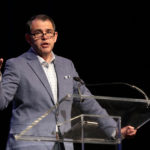PRAGUE, Czech Republic (ABP) — Global Baptist pastors' problems are as different as the countries and regions in which they minister, according to speakers at the July 21-24 Baptist World Alliance annual gathering in Prague.
Over the past year, the worldwide Baptist umbrella organization's church health and effectiveness workgroup has focused its attention on the health of pastors. Three presenters provided glimpses into the particular difficulties pastors experience in North America, Bulgaria and Chile.
David Laubach, the North American presenter, emphasized the stress pastors feel in relating to a culture increasingly at odds with their Christian heritage. He cited statistical evidence indicating a move away from church attendance as the norm in American and Canadian life.
Although statistics from 50 years ago show that 80 percent of Americans attended church regularly, that figure has fallen to somewhere between 42 and 20 percent — depending on whether one relies on individuals' self-reported attendance or actual Sunday-to-Sunday seat counts.
75 percent of US church have plateaued
According to Laubach, 75 percent of churches in the United States are plateaued or declining and 24 percent are growing because they are poaching new members from those declining churches.
Only 1 percent of U.S. churches are growing because they are reaching the unchurched population, he said.
Since most American churches are small, the issue of survival assumes critical importance and depletes energy and resources. Across denominational lines, those in churches of fewer than 100 members said that "keeping the church going" was their chief concern. That concern was only slightly less important in churches with fewer than 250 members.
"Shrinking resources, absence of biological growth, aging mainline denominational populations, mobility, consumerist/entertainment culture, a sometimes-hostile environment, increased pastoral expectations and role overload, dramatically shifting ecclesiology, church change and conflict" are among the stress producers North American clergy deal with regularly, Laubach asserted.
Sign up for our weekly edition and get all our headlines in your inbox on Thursdays
The stress can create its own problems, he noted, because "emotionally drained pastors can succumb to moral failure and personal and family breakdown."
Bulgarian Baptist problems different
The problems Bulgarian Baptists are experiencing are in sharp contrast to their North American brothers and sisters. Baptists in the former Eastern bloc nation are blessed with such rapid growth that they cannot produce leadership and build buildings fast enough to keep pace with conversions, reported Teodor Oprenov, their leader. Baptists in other former communist nations face similar problems.
The challenge in Bulgaria, he said, isn't the post-modernist philosophy feared by many Western theologians, but rather the post-communist philosophical vacuum left among the general populace.
"They don't believe in God, but are waiting to be told what to do," reasoned Oprenov.
Nonetheless, the rapid growth of Eastern Europe's Baptists has created a backlash from religious groups more traditional to the region. Bulgaria has a very strong Orthodox presence, and religious authorities are often seen as mediators between humans and God.
In some Eastern European areas, Orthodox leaders have led aggressive and even violent protests against Baptist churches, often with the tacit or explicit cooperation of local authorities.
Baptist pastors in Bulgaria are almost uniformly men and are not recognized as clergy by the government. Indeed, they often are seen as troublemakers. To gain entrance to some places of ministry, sometimes Baptist pastors dress in black, as Orthodox priests do.
Baptists in Chile are growing
The third presenter was the head of Chilean Baptists, Rachael Contraras, who represented a Latin American perspective. As in Bulgaria, the Chilean church is growing and experiencing opposition from more established religious groups.
But poverty is their main problem. According to Contraras, a typical Chilean Baptist pastor is a married man over 30 who has at least two children. The pastors tend to be poor and poorly educated.
Limited access to education and theological training creates problems. First, outreach to well-educated young adults can be difficult. Those who have had access to good education through the university level often find it hard to relate to unlettered pastors.
In addition, as evangelicals have gained influence in Chile, pastors are sometimes invited to participate in governmental or social work. Those who are organizationally inexperienced and uneducated may not reflect well on the churches and denominational tradition they represent — one still unfamiliar to the majority of Chileans. This can hinder Baptists from gaining the kind of social respect and influence that would benefit their work, Contraras said.
But the greatest problem affecting the health of Chilean pastors is their poverty. "Their income is very low compared to the people in his church and in society in general. He will live in a society in which everyone has a car, but he won't. Others will have houses, but he will not. He will live in a parsonage. Not having a place to live in retirement, he will preach until he dies," Contraras said.
Chilean pastors often work long hours in secular jobs to support their families. The stress of being the family provider and pastoring a church simultaneously has created such health issues as ulcers, burnout and depression, she said.
In Latin America generally, and in Chile in particular, pastors do not have access to public-health services, because the government does not provide any official recognition to the profession of pastoring.














We seek to connect God’s story and God’s people around the world. To learn more about God’s story, click here.
Send comments and feedback to Eric Black, our editor. For comments to be published, please specify “letter to the editor.” Maximum length for publication is 300 words.